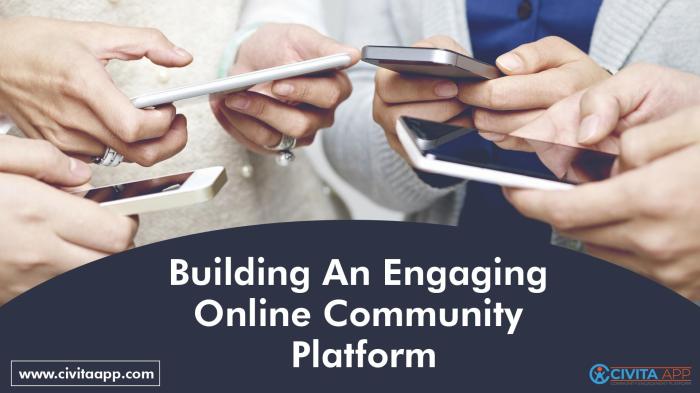Building Online Community Engagement is essential in today’s digital landscape, where connecting with your audience on a deeper level can make or break your brand’s success. From creating compelling content to utilizing cutting-edge technologies, this topic dives into the strategies and tools needed to cultivate a thriving online community.
Importance of Online Community Engagement: Building Online Community Engagement
Online community engagement is crucial for businesses and organizations as it allows them to connect with their target audience on a more personal level, leading to increased brand loyalty and customer retention. By building a strong online community, businesses can create a sense of belonging and foster a loyal customer base that actively engages with their content and products.
Hey y’all! Looking to boost your personal productivity? Check out these awesome Personal Productivity Hacks that will help you slay your to-do list like a boss!
Examples of Successful Online Communities
- Reddit: With millions of active users, Reddit has created a thriving online community where users can share content, engage in discussions, and connect with like-minded individuals. This has allowed businesses to tap into a diverse audience and promote their products/services effectively.
- Facebook Groups: Many businesses have successfully built online communities through Facebook Groups, where members can interact, share experiences, and provide support to one another. This has led to increased brand awareness and customer engagement.
Benefits of Building a Strong Online Community
- Enhanced Brand Loyalty: A strong online community fosters a sense of trust and loyalty among customers, leading to repeat purchases and recommendations to others.
- Increased Customer Retention: By engaging with customers regularly and providing valuable content, businesses can retain customers for the long term and reduce churn rates.
- Valuable Feedback: Online communities provide businesses with valuable feedback and insights from their customers, helping them improve products/services and stay ahead of competitors.
Strategies for Building Online Community Engagement
Creating and maintaining an active online community requires strategic planning and consistent effort. Here are some effective strategies to help foster engagement and interaction within your online community.
Yo, check it out! Looking to boost your personal productivity game? Well, we got you covered with some killer Personal Productivity Hacks that will have you crushing deadlines and smashing goals like a pro. Say goodbye to procrastination and hello to efficiency with these dope tips!
Creating Engaging Content
- Develop valuable and relevant content that resonates with your target audience.
- Use a variety of content formats such as videos, infographics, and blog posts to keep the community interested.
- Encourage user-generated content to increase participation and create a sense of ownership among members.
Fostering Discussions
- Initiate conversations by asking thought-provoking questions and seeking opinions from community members.
- Moderate discussions to ensure a positive and respectful environment for all participants.
- Highlight valuable contributions and acknowledge active members to promote engagement.
Hosting Events
- Organize virtual events such as webinars, live Q&A sessions, and contests to bring the community together.
- Create exclusive events for community members to provide added value and incentives for participation.
- Promote events across various channels to reach a wider audience and attract new members.
Comparing Platforms for Building Online Communities, Building Online Community Engagement
- Social Media: Offers a wide reach and instant interaction but may lack depth in discussions.
- Forums: Provide a dedicated space for in-depth conversations and knowledge sharing but require active moderation.
- Websites: Allow for more control over content and branding but may require more effort to drive traffic and engagement.
Tips for Encouraging Active Participation
- Set clear guidelines and expectations for community behavior to maintain a positive environment.
- Offer incentives such as rewards, badges, or exclusive content for engaged members.
- Regularly solicit feedback from the community to understand their needs and preferences for future engagement strategies.
Tools and Technologies for Enhancing Online Community Engagement

In order to effectively manage and enhance online communities, various tools and technologies are utilized to streamline processes, analyze data, and improve engagement with users.
Popular Tools and Technologies
- Social Media Management Platforms: Tools like Hootsuite, Buffer, and Sprout Social help in scheduling posts, monitoring conversations, and analyzing engagement metrics across different social media platforms.
- Community Forums and Platforms: Platforms like Discourse, Reddit, and Slack provide spaces for users to interact, share information, and engage in discussions within a community setting.
- Customer Relationship Management (CRM) Software: CRM tools such as Salesforce, HubSpot, and Zoho CRM enable businesses to manage customer interactions, track engagement, and personalize communication with community members.
Role of Analytics in Measuring Online Community Engagement
Analytics play a crucial role in measuring the success and effectiveness of online community engagement efforts. By analyzing key metrics such as website traffic, social media engagement, conversion rates, and user behavior, organizations can gain valuable insights into the preferences and interests of their community members. This data helps in optimizing content, identifying trends, and making informed decisions to improve overall engagement and user satisfaction.
Utilizing Automation and AI for Community Engagement
Automation and AI technologies can significantly enhance online community engagement by streamlining processes, personalizing interactions, and providing real-time support to users. Chatbots, for example, can automate responses to common queries, provide instant assistance, and facilitate seamless communication within the community. AI-powered algorithms can also analyze user data, predict behavior patterns, and deliver targeted content to enhance engagement and foster a sense of community among members.
Challenges in Building Online Community Engagement

Building and maintaining online community engagement comes with its own set of challenges that organizations need to overcome in order to foster a thriving online community. Let’s explore some common challenges faced and effective strategies to tackle them.
1. Lack of Active Participation
One of the biggest challenges in building online community engagement is getting members to actively participate and contribute. It can be difficult to motivate members to engage consistently.
- Encourage participation through gamification techniques such as badges, rewards, and challenges.
- Create a sense of belonging by highlighting member contributions and fostering a supportive community environment.
- Host regular interactive events like webinars, live Q&A sessions, and contests to keep members engaged.
2. Managing Negative Feedback
Dealing with negative feedback or criticism within an online community can be challenging and may impact community engagement if not handled properly.
- Establish clear community guidelines and moderation policies to address negative behavior effectively.
- Respond to negative feedback promptly and professionally, showing empathy and a willingness to address concerns.
- Turn negative feedback into an opportunity for growth by using it as constructive feedback to improve community engagement strategies.
3. Maintaining Content Relevance
Keeping the content fresh, relevant, and engaging is crucial for sustaining online community engagement over time. It can be challenging to consistently produce high-quality content that resonates with members.
- Regularly analyze data and gather feedback to understand what content resonates with your community and tailor future content accordingly.
- Invite members to contribute user-generated content to diversify the content offerings and keep the community engaged.
- Collaborate with influencers or industry experts to provide valuable insights and perspectives that are relevant to your community.
Real-life Example:
A fitness app successfully overcame the challenge of lack of active participation by implementing a point-based reward system that incentivized users to track their workouts and share their progress with the community. This led to increased engagement levels and a sense of community among users.
